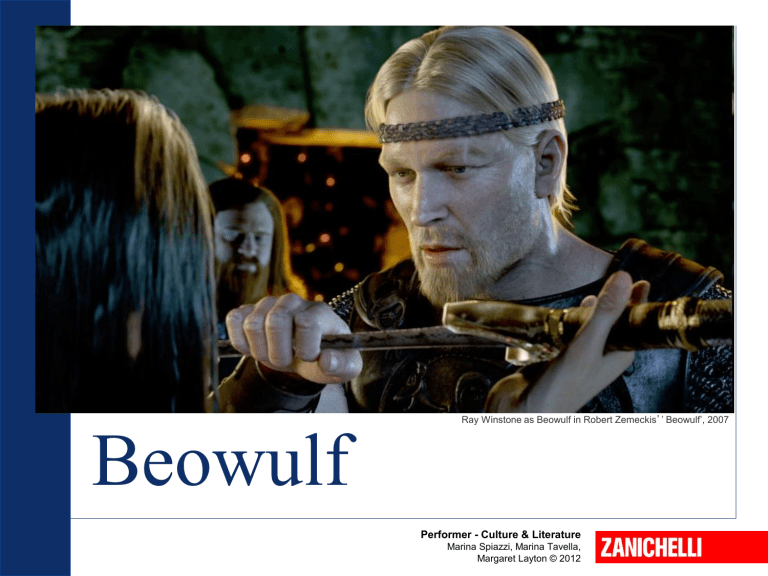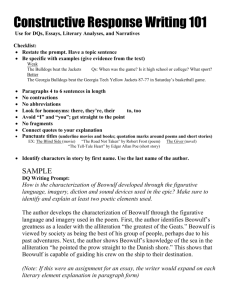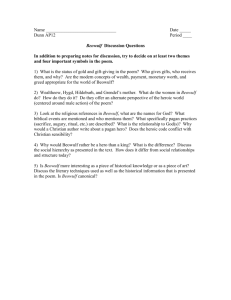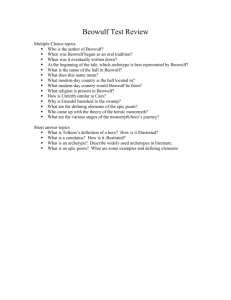Beowulf

Ray Winstone as Beowulf in Robert Zemeckis ’ ’ Beowulf’, 2007
Beowulf
Performer - Culture & Literature
Marina Spiazzi, Marina Tavella,
Margaret Layton © 2012
Beowulf
1.
The epic poem
•
It is a long narrative poem .
It deals with: the recollection of a glorious past in the history of a country the brave deeds of heroes
•
History is the frame, but supernatural elements are the canvas of the poem.
Performer - Culture & Literature
Beowulf
1.
The epic poem
•
An aristocratic military society is described .
•
The narrative of the poem is made up of a series of type-scenes – battles, banquets, funerals, voyages .
•
The main theme is the nature of heroic life .
•
The language is vivid and the style is elevated .
Performer - Culture & Literature
Beowulf
2.
The background
•
The oldest surviving poem written in Anglo-Saxon more than 1200 years ago.
•
The poet is unknown .
•
The date of composition is unknown (from the 8 th century to the 11 th century ).
•
It deals with a time following the initial invasion of England by Germanic tribes in 449 (5 th -6 th cent.).
Performer - Culture & Literature
Beowulf
3.
The characters
•
Beowulf , the war leader of the Geats, a group of people in what is now southern Sweden.
•
Hrothgar , the King of the Danes.
•
The Swedes .
•
Wiglaf , Beowulf ’ s warrior.
Performer - Culture & Literature
Beowulf
3.
The characters
A scene of Robert Zemeckis ’
‘ Beowulf ’ , 2007
•
Grendel , the monster.
•
Grendel ’s mother .
•
The fire-breathing dragon .
Performer - Culture & Literature
Beowulf
4.
Warrior code in the poem
•
Loyalty to the king.
•
King generous, protected by his warriors / thanes
•
Reputation thanes were expected to be loyal , brave , courageous ; kings were expected to be generous and hospitable .
Performer - Culture & Literature
Beowulf
4.
Warrior code in the poem
•
The need to take revenge .
•
Physical strength and courage .
•
The search for glory in this life.
•
The importance of fate .
Performer - Culture & Literature
Beowulf
5.
Settings
Scandinavia
Northumbria
Heorot
The misty lake
The land of the
Geats in Sweden where the actions of the poem take place an Anglo-Saxon kingdom, where the poem was probably written where Beowulf confronts the monster Grendel where Beowulf fights against
Grendel ’s mother where Beowulf confronts a fire-breathing dragon
Performer - Culture & Literature
Beowulf
6.
Christian elements
•
Beowulf prays to the Creator of all things, the ruler of the Heavens.
•
God ’s will: identical with fate ( wyrd ).
•
Grendel : the descendent of Cain , the first murderer of the Old Testament.
•
References to the Old Testament .
Performer - Culture & Literature
Beowulf
7.
Supernatural elements
•
Superhuman powers are attributed to Beowulf.
•
Several monsters appear in the poem.
•
The supernatural lake, where Grendel and his mother live, is filled with sea-monsters.
Performer - Culture & Literature
Beowulf
8.
Style
•
Alliteration
He r ippled down the r ock, w rithing w ith anger
•
Extensive use of kennings
The hoard-guardian
(the guardian of the treasure = the monster)
The ring-giver (the king)
•
Elevated language
They extolled (praised) his heroic nature and exploits (deeds) and gave thanks for his greatness
•
Long lists of leaders and warriors
Performer - Culture & Literature
Beowulf
9.
Themes
•
The feud = the tragic waste.
•
A system of revenge is repeated in the poem: feud peace feud
•
The eternal conflict between dark and light, good and evil .
•
Tension between the heroic code and
Christianity .
•
Fate .
•
Courage as the quality that can stand against Fate.
•
The importance of the past .
Performer - Culture & Literature





